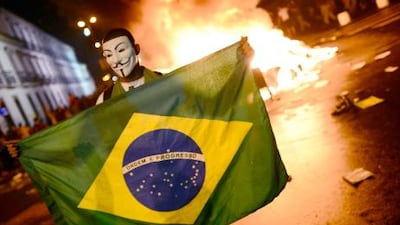RECIFE // While the city streets of Rio de Janeiro, Sao Paulo, Brasilia and Porto Alegre spent Monday evening gridlocked by demonstrators protesting against a range of issues, residents of the northeastern coastal metropolis of Recife were meeting to decide when they should march. It appears the famous grumble among Brazil's southern population is true: everything takes longer to get done in the country's Nordeste.
Sepp Blatter, the Fifa president, said the country's demonstrators are using football as a platform. Recife, the beachfront city home to almost four million people, has a distressing homicide rate and a significant problem with prostitution, particularly in minors. Before Sunday's Confederations Cup match between Spain and Uruguay, groups of volunteers greeted fans at the Cosme e Damiao Station with flyers warning: "Paedophilia is a crime. Denounce it."
Yet while Brazilian protestors took to the streets of some of the country's biggest cities to condemn cost of living, corruption and high crime rates, the only obvious sign of discontent among residents of Boa Viagem, a urban seaside town south of Recife's city centre, came in the form of a banner hanging from an apartment balcony near the promenade: "Menos Copa. Mais Escola." Less Cup. More Education.
Small marches took place in central Recife on Monday evening, but by and large Boa Viagem, with its fresh coconuts, grilled cheese and frozen acai berry smoothies, appeared picture perfect. Residents jogged and cycled along the palm-lined esplanade while a group of Uruguayans cleared their minds of defeat by sunning themselves on the beach in the afternoon. (Note: Despite the 25ºC temperatures, few bathers enter the water due to prominent signs: "Risk of shark attack.")
Young skateboarders practised tricks in the Parque Dona Lindu, which during Monday's match between Tahiti and Nigeria had all the foundations of a Fifa fan zone except electricity (and, resultantly, fans).
As the sun set, Guilherme Costa, sitting in the park with his guitar, said he would attend a protest on Thursday evening. He criticised the excessive cost of the World Cup stadiums and said he would have liked the money to be spent on public transport and healthcare instead.
Recife is home to the Arena Pernambuco, which will host on Wednesday night's match between Italy and Japan. The stadium cost R$532m (Dh917m) and is located far from the city centre in a bid to promote suburban development. Spectators complained of a long, tiring commute.
From Boa Viagem, the easiest economical route to the 45,000-seat stadium is to take a bus for 25 minutes, a train for an hour, another shuttle for 10 minutes and then walk roughly 1.5km.
On Sunday evening, 90 minutes before kick-off, Cosme e Damiao train station was so congested that many spectators were unable to alight. One man wearing a Spain shirt said "If it is like this next summer, there will be a crush. It's dangerous. It's a failure".
From outside the ground, the arena is majestic, lit up colourfully at night and surrounded by nothing but darkness. By day, much of the nearby area appears as it is: a construction site. This weekend, while the seating and pitch proved immaculate, several of the spiral walkways leading in and out of the stadium were littered with wooden crates and scrap metal. Signage was sparse.
The verdict on the front page of Jornal do Commercio, the daily newspaper for the state of Pernambuco, read: "Beautiful and modern, but still not practical or comfortable". It conceded the arena's completion schedule had been brought forward because Fifa added it late to the Confederations Cup roster.
"Sure it's a nice stadium, but have you seen the bus we had to take to get here?" Rodrigo Florio, a spectator from Montevideo, said after the match. "The transport is the big problem. The rest is small."
Work certainly needs to be done, but it is reasonable to assume Recife's issues will be improved in time for the influx of half a million tourists to Brazil for the World Cup. The same cannot be said with certainty of the problems that have led to the widespread protests. Monday's march in the city managed no more than 1,000 people, but Thursday's is expected to attract more than 10,000.
Costa, with his guitar resting on his lap, said he will attend with three friends and will take placards. He is not against the World Cup, but rather the fact it seems to get priority over the people's needs.
Brazil is at a critical juncture and how it unravels in the coming days, weeks and months will determine its future. Football might be being used as a platform, but a safer or cheaper or healthier or better educated Brazil would be quite some legacy were it to emerge off the back of the global showpiece's presence.
On Thursday, Recife will get its ball rolling.
Follow us
and @gmeenaghan

